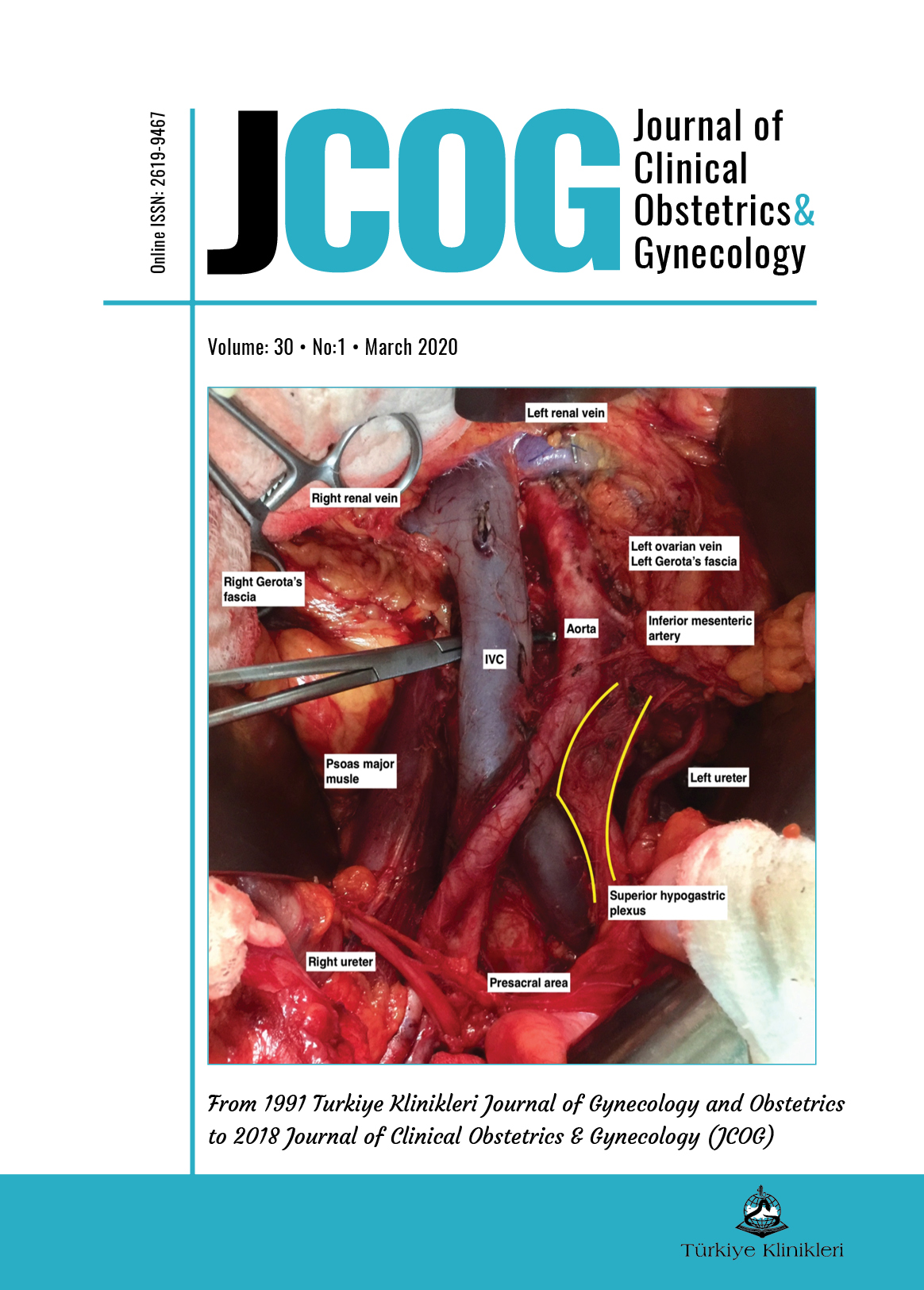Open Access
Peer Reviewed
ORIGINAL RESEARCH
2658 Viewed1494 Downloaded
Retrospective Evaluation of Pregnancy Outcomes with Maternal Epilepsy
Received: 28 Dec 2019 | Received in revised form: 28 Feb 2020
Accepted: 28 Feb 2020 | Available online: 05 Mar 2020
J Clin Obstet Gynecol. 2020;30(1):20-5
DOI: 10.5336/jcog.2019-73172
Article Language: EN
Article Language: EN
Copyright Ⓒ 2025 by Türkiye Klinikleri. This is an open access article under the CC BY-NC-ND license (http://creativecommons.org/licenses/by-nc-nd/4.0/)
ABSTRACT
Objective: To evaluate the clinical characteristics and obstetric outcomes of pregnant women with epilepsy at a tertiary center. Material and Methods: A total of 81 pregnant women with epilepsy were included in this retrospective cohort study. Clinical characteristics and obstetric outcomes were evaluated. Results: The mean maternal age of our cohort was 28.81±5.2 years, mean gravida was 1.78±1.17, mean gestational week at delivery was 37.8±2.07 , and mean birth weight was 2973±688.8 g with 4 (4.9%) preterm deliveries. Gestational diabetes mellitus was observed in 2 cases. Fetal growth restriction was detected in 3 (3.7%) cases. Ten neonates (12.3%) were admitted to the neonatal intensive care unit and no congenital chromosomal/structural anomalies were detected in any of the cases. Intrauterine fetal demise was observed in 1 (1.2%) case. The mean duration of epilepsy was 8.14 ± 5.8 years. Antiepileptic drugs were continued in 59 (72.8%) cases (11 polytherapy and 48 monotherapy). Six cases (7.4%) had seizures during pregnancy, and all 6 cases included patients who used medications during pregnancy. Conclusion: Favorable outcomes can be achieved in pregnant women with appropriately managed epilepsy.
Objective: To evaluate the clinical characteristics and obstetric outcomes of pregnant women with epilepsy at a tertiary center. Material and Methods: A total of 81 pregnant women with epilepsy were included in this retrospective cohort study. Clinical characteristics and obstetric outcomes were evaluated. Results: The mean maternal age of our cohort was 28.81±5.2 years, mean gravida was 1.78±1.17, mean gestational week at delivery was 37.8±2.07 , and mean birth weight was 2973±688.8 g with 4 (4.9%) preterm deliveries. Gestational diabetes mellitus was observed in 2 cases. Fetal growth restriction was detected in 3 (3.7%) cases. Ten neonates (12.3%) were admitted to the neonatal intensive care unit and no congenital chromosomal/structural anomalies were detected in any of the cases. Intrauterine fetal demise was observed in 1 (1.2%) case. The mean duration of epilepsy was 8.14 ± 5.8 years. Antiepileptic drugs were continued in 59 (72.8%) cases (11 polytherapy and 48 monotherapy). Six cases (7.4%) had seizures during pregnancy, and all 6 cases included patients who used medications during pregnancy. Conclusion: Favorable outcomes can be achieved in pregnant women with appropriately managed epilepsy.
KEYWORDS: Carbamazepine; epilepsy; fetal; levetiracetam; neonatal; outcome; pregnancy; valproic acid
REFERENCES:
- Putignano D, Clavenna A, Campi R, Canevini MP, Vignoli A, Battino D, et al. Perinatal outcome and healthcare resource utilization in the first year of life after antiepileptic exposure during pregnancy. Epilepsy Behav. 2019;92:14-7. [Crossref] [PubMed]
- Borthen I, Eide MG, Veiby G, Daltveit AK, Gilhus NE. Complications during pregnancy in women with epilepsy: population‐based cohort study. BJOG. 2009;116(13):1736-42. [Crossref] [PubMed]
- Razaz N, Tomson T, Wikström AK, Cnattingius S. Association between pregnancy and perinatal outcomes among women with epilepsy. JAMA Neurol. 2017;74(8):983-91. [Crossref] [PubMed] [PMC]
- Shihman B, Goldstein L, Amiel N, Benninger F. Antiepileptic drug treatment during pregnancy and delivery in women with epilepsy-a retrospective single center study. Epilepsy Res. 2019;149:66-9. [Crossref] [PubMed]
- Leach JP, Smith PE, Craig J, Bagary M, Cavanagh D, Duncan S, et al. Epilepsy and pregnancy: for healthy pregnancies and happy outcomes. Suggestions for service improvements from the Multispecialty UK Epilepsy Mortality Group. Seizure. 2017;50:67-72. [Crossref] [PubMed]
- Kilic D, Pedersen H, Kjaersgaard MIS, Parner ET, Vestergaard M, Sørensen MJ, et al. Birth outcomes after prenatal exposure to antiepileptic drugs--a population‐based study. Epilepsia. 2014;55(11):1714-21. [Crossref] [PubMed]
- Veroniki AA, Cogo E, Rios P, Straus SE, Finkelstein Y, Kealey R, et al. Comparative safety of anti-epileptic drugs during pregnancy: a systematic review and network meta-analysis of congenital malformations and prenatal outcomes. BMC Med. 2017;15(1):95. [Crossref] [PubMed] [PMC]
- Farmen AH, Grundt J, Tomson T, Nakken KO, Nakling J, Mowinchel P, et al. Intrauterine growth retardation in foetuses of women with epilepsy. Seizure. 2015;28:76-80. [Crossref] [PubMed]
- Weston J, Bromley R, Jackson CF, Adab N, Clayton Smith J, Greenhalgh J, et al. Monotherapy treatment of epilepsy in pregnancy: congenital malformation outcomes in the child. Cochrane Database Syst Rev. 2016;11(11):CD010224. [Crossref] [PMC]
- Soontornpun A, Choovanichvong T, Tongsong T. Pregnancy outcomes among women with epilepsy: a retrospective cohort study. Epilepsy Behav. 2018;82:52-6. [Crossref] [PubMed]
- Viale L, Allotey J, Cheong-See F, Arroyo-Manzano D, Mccorry D, Bagary M, et al. Epilepsy in pregnancy and reproductive outcomes: a systematic review and meta-analysis. Lancet. 2015;386(10006):1845-52. [Crossref]
- MacDonald SC, Bateman BT, McElrath TF, Hernández-Díaz S. Mortality and morbidity during delivery hospitalization among pregnant women with epilepsy in the United States. JAMA Neurol. 2015;72(9):981-8. [Crossref] [PubMed] [PMC]
- Edey S, Moran N, Nashef L. SUDEP and epilepsy‐related mortality in pregnancy. Epilepsia. 2014;55(7):e72-4. [Crossref] [PubMed]
- EURAP Study Group. Seizure control and treatment in pregnancy: observations from the EURAP epilepsy pregnancy registry. Neurology. 2006;66(3):354-60. [Crossref] [PubMed]
- Bech BH, Kjaersgaard MIS, Pedersen HS, Howards PP, Sørensen MJ, Olsen J, et al. Use of antiepileptic drugs during pregnancy and risk of spontaneous abortion and stillbirth: population based cohort study. BMJ. 2014;349:g5159. [Crossref] [PubMed] [PMC]
- Allotey J, Aroyo-Manzano D, Lopez P, Viale L, Zamora J, Thangaratinam S. Global variation in pregnancy complications in women with epilepsy: a meta-analysis. Eur J Obstet Gynecol Reprod Biol. 2017;215:12-9. [Crossref] [PubMed]
- Hernández‐Díaz S, McElrath TF, Pennell PB, Hauser WA, Yerby M, Holmes LB, et al. Fetal growth and premature delivery in pregnant women on antiepileptic drugs. Ann Neurol. 2017;82(3):457-65. [Crossref] [PubMed]
MENU
POPULAR ARTICLES
MOST DOWNLOADED ARTICLES





This journal is licensed under a Creative Commons Attribution-NonCommercial-NoDerivatives 4.0 International License.










